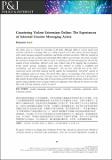Files in this item
Countering violent extremism online : the experiences of informal counte rmessaging activists
Item metadata
| dc.contributor.author | Lee, Benjamin | |
| dc.date.accessioned | 2021-07-29T11:30:16Z | |
| dc.date.available | 2021-07-29T11:30:16Z | |
| dc.date.issued | 2020-03-16 | |
| dc.identifier.citation | Lee , B 2020 , ' Countering violent extremism online : the experiences of informal counte rmessaging activists ' , Policy & Internet , vol. 12 , no. 1 , pp. 66-87 . https://doi.org/10.1002/poi3.210 | en |
| dc.identifier.issn | 1944-2866 | |
| dc.identifier.other | PURE: 274589053 | |
| dc.identifier.other | PURE UUID: 0cb9995c-07e6-4534-8175-b2a6a89d4b47 | |
| dc.identifier.other | Scopus: 85082324126 | |
| dc.identifier.uri | https://hdl.handle.net/10023/23676 | |
| dc.description | This work was funded by the Centre for Research and Evidence on Security Threats (CREST). CREST is commissioned by the Economic and Social Research Council (ESRC Award: ES/N009614/1) with funding from the UK Intelligence Community. | en |
| dc.description.abstract | The online space is a haven for extremists of all kinds. Although efforts to remove violent and extremist content are increasing, there is a widely accepted need to also contest extremist messages with counter messages designed to undermine and disrupt extremist narratives. While the majority of academic focus has been on large and well-funded efforts linked to governments, this article considers the experiences of informal actors who are active in contesting extremist messaging but who lack the support of large institutions. Informal actors come without some of the baggage that accompanies formal counter message campaigns, which have been attacked as lacking in credibility and constituting “just more government propaganda.” This has been noted by some of the wider countering violent extremism industry and the appetite for incorporating “real-world” content in their campaigns seems to be rising. This article fills a gap in our knowledge of the experiences of informal counter messaging actors. Through a series of in-depth qualitative interviews it demonstrates that, despite the potentially serious risks of incorporating greater levels of informal content, there is an appetite among informal actors to engage with formal campaigns where they can be selective over who they work with and maintain a degree of control. | |
| dc.language.iso | eng | |
| dc.relation.ispartof | Policy & Internet | en |
| dc.rights | Copyright © 2019 The Authors. Policy & Internet published by Wiley Periodicals, Inc. on behalf of Policy Studies Organization. This is an open access article under the terms of the Creative Commons Attribution License, which permits use, distribution and reproduction in any medium, provided the original work is properly cited. | en |
| dc.subject | Counter messaging | en |
| dc.subject | Counter narrative | en |
| dc.subject | Terrorism | en |
| dc.subject | Extremism | en |
| dc.subject | Countering violent extremism | en |
| dc.subject | Security | en |
| dc.subject | JZ International relations | en |
| dc.subject | T-NDAS | en |
| dc.subject | SDG 16 - Peace, Justice and Strong Institutions | en |
| dc.subject.lcc | JZ | en |
| dc.title | Countering violent extremism online : the experiences of informal counte rmessaging activists | en |
| dc.type | Journal article | en |
| dc.description.version | Publisher PDF | en |
| dc.contributor.institution | University of St Andrews. School of International Relations | en |
| dc.identifier.doi | https://doi.org/10.1002/poi3.210 | |
| dc.description.status | Peer reviewed | en |
This item appears in the following Collection(s)
Items in the St Andrews Research Repository are protected by copyright, with all rights reserved, unless otherwise indicated.

